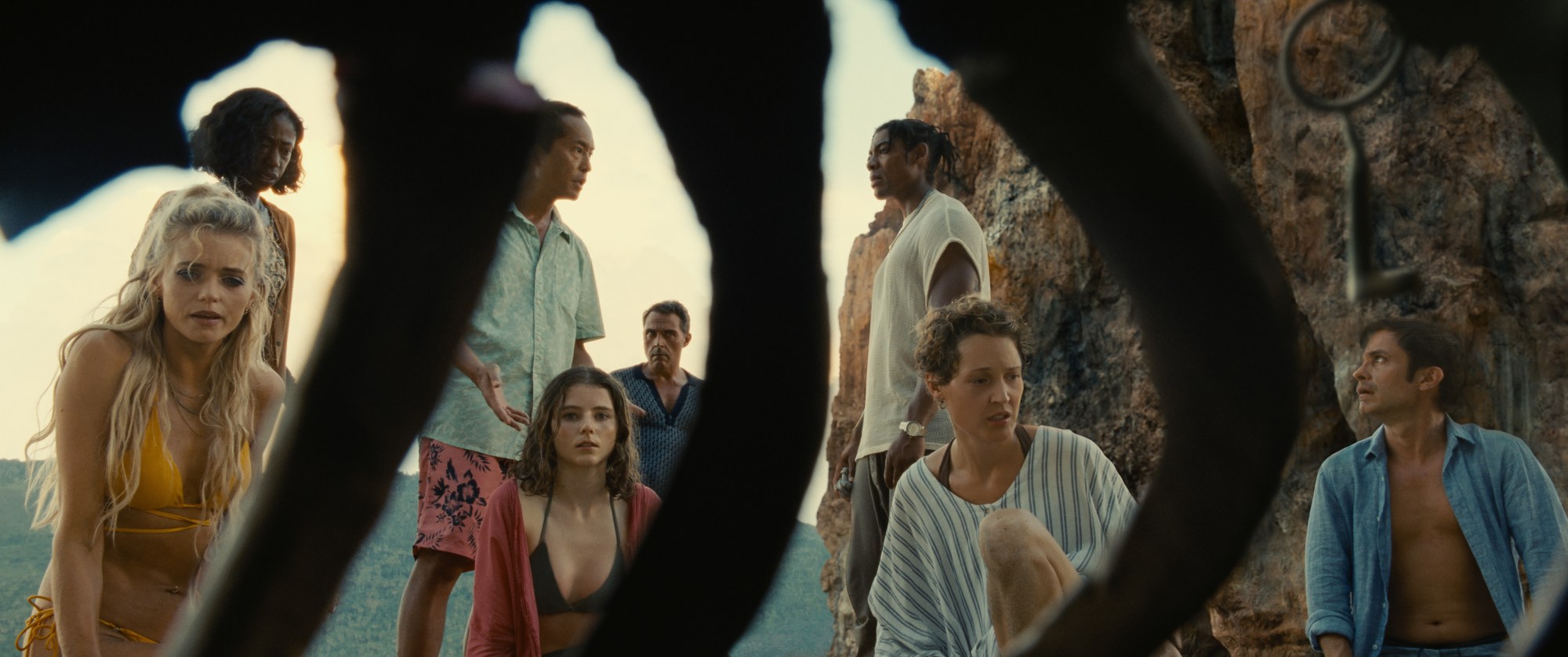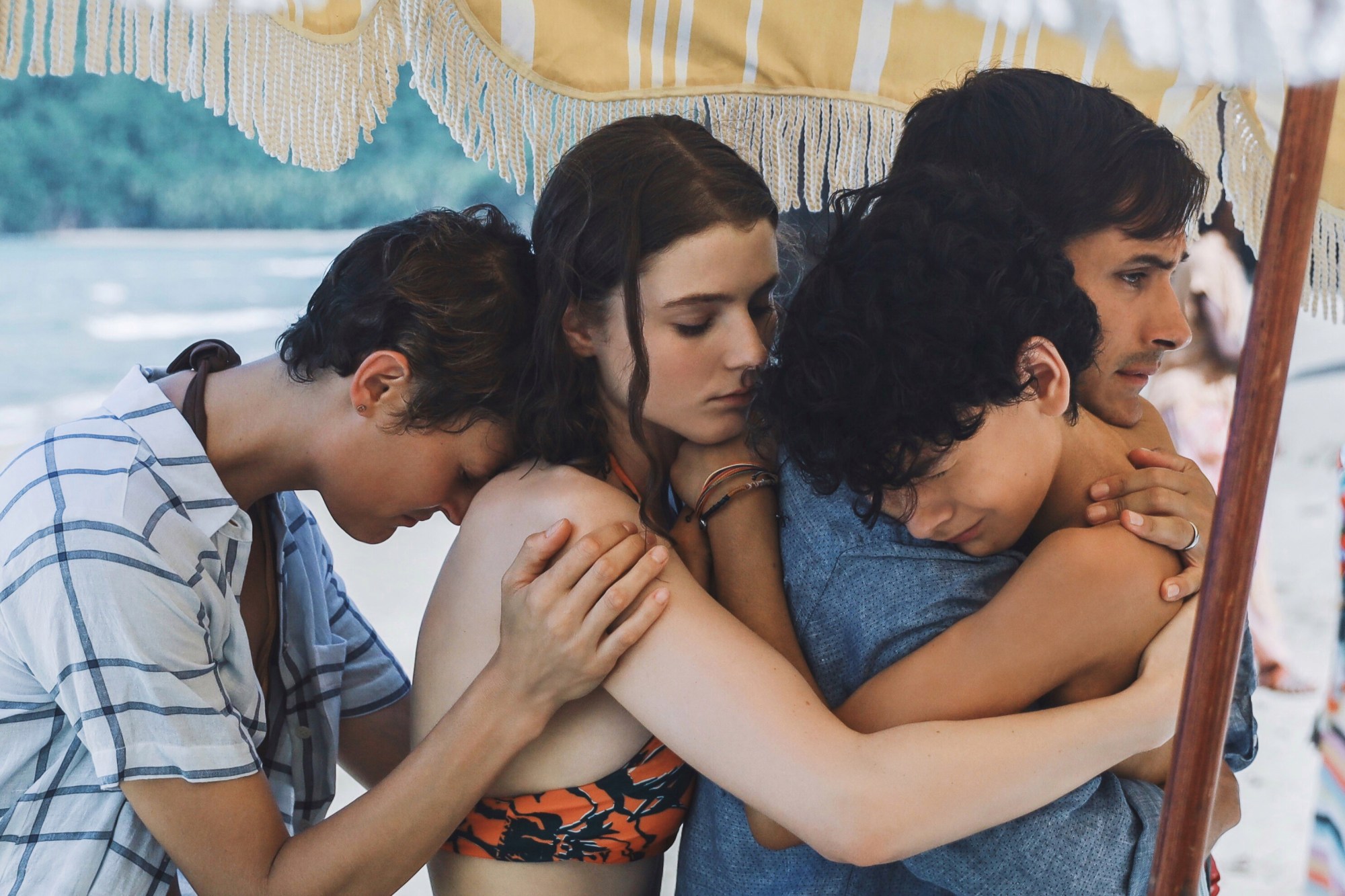In M. Night Shyamalan’s new film, a family travels to a beach and starts to get really old, really fast. Similar to how The Curious Case of Benjamin Button is invoked as a kind of meme, you could be forgiven for taking the central premise of Old to be a joke — until, of course, it’s not. Previously harmless tumours begin to grow rapidly out of control; pregnancies spiral forward at an unnatural rate; extremely-early-onset dementia is settling in, becoming severe, and turning the situation violent. The M. Night age-play movie is here, and it’s not fucking around.
But tucked in between the scenes of gore, panic and existential horror are calmer, meditational moments about ageing — more specifically, the ever-increasing distance between the present and one’s youth. “I tried to describe something ineffable, really,” says M. Night. “The child who is trying to explain how it feels to suddenly now be 20-something talks about how there are more colours in the world than before, but they’re quieter. She’s saying: ‘I see more, but it doesn’t mean as much to me.’”
Like many of the director’s projects, Old is something of a Trojan horse for larger thematic questions — this time, about mortality and personhood. Based on the 2010 graphic novel Sandcastle, written by Pierre Oscar Lévy and drawn by Frederik Peeters, Old sees its protagonists have their whole lives effectively reduced to the span of a single day. The philosophical ambition of this premise is, according to the director, nothing like audiences have ever seen before.
Though Old features genuinely pensive insights and boasts some of the director’s gnarliest body horror, it is also, fundamentally, kind of a silly movie. This is the natural result of the director’s blending of multiple genre components, particularly as this leans towards horror-comedy, a genre which Shyamalan arguably pioneered with 2015’s The Visit (walking so Jordan Peele could run, etc.) Three decades into a decidedly controversial career, the director gives us an insight into the making of Old, his present thoughts on the horror genre, getting older himself, his often maligned love of cameos, and more.
Hey M. Night, how’s it going today?
Good, good, having great conversations. It’s fun to talk about people’s emotions because that’s what I get the most excited about — how they’re reacting to the movie and their feelings about it.
So are you a person that quite enjoys doing press then?
You know, it’s funny! It’s so strange for me, because these are such personal movies. And most of the time it’s the actors that are doing junkets like this. They made a movie: they spent six weeks on it, and then they talked about it. But for me, I’ve spent every second for two years — up until the very second I talk to you — only thinking about this movie. So there’s a lot to talk about.
Great, then let’s get right into it. This is going to be your first feature release since Glass in 2019 and you’re coming up on nearly 30 years of filmmaking. How are you feeling about your career at the moment?
I’m grateful for sure. People are still interested in coming to hear the stories coming out of my head, which is unbelievable. I try to go back to the feeling I had when I was in the car with my mom and dad, driving through the Holland Tunnel to drop me off at NYU. I remember the feeling like I wanted to literally jump out of the car and run to the film school. I could not wait to start thinking about making movies. My parents are both doctors who probably thought I was insane at that time. But that excitement, I do still have that. So how long can I make that the reason I’m making movies?
As a kind of addendum, let’s talk a bit about Old and some of your more recent feelings on age and ageing.
I think when you’re younger, everything is binary: “I’m in love!” or “I hate you, mom!” As you get older, everything gets a little bit more subtle. We don’t notice it, because it happens over decades for us. But [Old asks], what if it happened in a matter of hours?

Is that an observation you made looking at your own life?
Right now, I would say I’m different than I was 10 years ago. Specifically, I am much more muted. And that’s a sad thing, but maybe a helpful thing, because I don’t get as high but I also don’t get as low. I miss the intensity of the colours, the up and the down, but now because of that I’m able to have more nuanced conversations about things and I can see things [that I couldn’t before]. Everything isn’t the end of the world or the most important thing. It’s all part of this kind of beautiful, larger song.
Did you find that this was quite an emotional shoot for you? You have all these existential ideas buzzing around, COVID hits, and then a hurricane comes and destroys the set. How were you feeling at that time?
This probably goes to the previous question. How I reacted to it was very different to other times. I kind of went: “Hey, I can’t control that. I made the decision to come here. I made it for the right reasons, I believe. Let’s just keep rehearsing, and let’s rebuild in a smarter way,” that kind of thing. So I remember not being as traumatised about it as I probably would have been at, say, 30 years old. And in the end, it worked out. I think the narrowing of my emotions has helped in those circumstances.
Who, in your opinion, is dominating the horror genre at the minute? What are some of the best recent releases you can think of?
I haven’t seen everything, so if I’m not mentioning something it’s literally because I haven’t seen it, but when I think of my favourite movies and their impacts, this set of movies has really affected me. The Babadook, It Follows, Hereditary, Ex Machina, The Witch: this set of very auteur, point-of-view [films]. I might take issue with some of their endings — as you know I’m a very endings-oriented person — but the salient feeling of darkness that each of those films creates is very inspiring. And I know the rarity of what they achieved in the body of those movies was exceptional, whether [the filmmakers] even know how exceptional it was. It was this rare combination of hearing a note and following it in a way that was just amazing.

I’ve noticed that you’re a bit of a cameo king. What is the particular appeal of appearing in your own films for you?
It probably comes from a deep-seated desire in many ways. The first movie that I ever made, I played the lead. I was 21 and we shot it in India. There was this idea of being writer, director, and actor that was influenced by the filmmakers of that time on the East Coast.
I love the art form of acting. For me, learning to be present as an actor is so powerful. It’s very hard to do when I’m the director and writer because those roles almost require the opposite of that: I’m kind of watching it more broadly, and trying to listen to that.
A couple of years ago you spoke to Vulture about the “audacity” of making a sequel that nobody knew was a sequel. What would you say is the most audacious aspect of this film?
When we’re saying audacious… perhaps it’s the “risk” that the leads are international, and that they play their [regular] accents. [Gael García Bernal] is not playing a Mexican dad, they’re just playing a dad. It’s the audacity of saying: “Hey, we’re [characters] that don’t sound like you, that you have to identify with anyway.”
And then of course there’s setting a visceral thriller outside in broad daylight, juxtaposing something that’s supposed to be scary and making it all broad daylight and beautiful.
A big Midsommar vibe.
Exactly! Using cinematic languages that are newish for audiences, and certainly balancing tones of humour and mystery and Gothic horror and drama, and making sure that we’re getting that balance into a place that I like. I do love to push people, to keep people uncomfortable. Where I feel most excited to tell a story is: “Oh, wow, this is unnerving. Where we’re at, I’m right on the edge.”
Old will arrive in cinemas in the US and the UK on 23 July.

